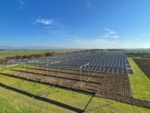Baden-Württemberg and its companies
Bioeconomy refers to the sustainable management of renewable natural resources, which is why there is no such thing as a bioeconomy industry in the traditional sense. However, there are companies in Baden-Württemberg that use biomass as raw material base and have already developed products and processes in their effort to act more sustainably
The energy producer badenova uses male corn plants to produce renewable natural gas (RNG). The company circumvents the food vs fuel conflict as the male plants are only used to pollinate female corn before being discarded. A company called TECNARO from Ilsfeld/Auenstein near Heilbronn has developed a technology that it uses to produce injection-mouldable plastics and fibrous materials from lignin. These materials are already being used in numerous products. The company fischerwerke has developed a wall plug that is partially produced from renewable resources. The wall plug is produced from two-component nylon, and one of the two components is produced from castor oil. Daimler AG's A-Class is equipped with an engine cover that is also produced with a plastic partially made from biological resources.
Companies not only face challenges relating to products, but also concerning innovative production processes. New methods and machines need to be developed in order to be able to use biomass sustainably on an industrial scale. This means that traditional sectors such as the mechanical engineering and plant construction sectors must be made aware and persuaded of the necessity and benefits of the bioeconomy.
Company profiles
-
Think Tank FYI: Agriculture 5.0 - 16/02/2023

Climate protection, agriculture and biodiversity are closely intertwined. Agriculture 5.0 provides positive guidance, as the Offenburg University of Applied Sciences has demonstrated: agrophotovoltaics (or agrivoltaics), which is currently in vogue in Germany, can be used to generate solar power on high-yield fields. Biomass strips and biochar remove CO2 from the atmosphere. All this improves soil quality and promotes biodiversity.
-
Review - 09/02/2023

The societal importance of genetic technologies was demonstrated during the coronavirus pandemic, when it was possible to rapidly develop suitable vaccines thanks to genetic engineering methods. As a result, the Fifth Gene Technology Report published in autumn 2021 reads like a validation of many years of work, as well as making it clear that the will to continue the detailed long-term monitoring is very much present.
Company foundations in the bioeconomy field
-
Think Tank FYI: Agriculture 5.0 - 16/02/2023

Climate protection, agriculture and biodiversity are closely intertwined. Agriculture 5.0 provides positive guidance, as the Offenburg University of Applied Sciences has demonstrated: agrophotovoltaics (or agrivoltaics), which is currently in vogue in Germany, can be used to generate solar power on high-yield fields. Biomass strips and biochar remove CO2 from the atmosphere. All this improves soil quality and promotes biodiversity.
-
Review - 09/02/2023

The societal importance of genetic technologies was demonstrated during the coronavirus pandemic, when it was possible to rapidly develop suitable vaccines thanks to genetic engineering methods. As a result, the Fifth Gene Technology Report published in autumn 2021 reads like a validation of many years of work, as well as making it clear that the will to continue the detailed long-term monitoring is very much present.
News of bioeconomic companies
-
Press release - 10/07/2023
7591 red deer, 3443 roe deer, 4876 wild boar, 36 wolves, 16 lynxes and 227 red foxes: These are the results of the first standardised monitoring of wildlife populations in ten large protected areas in Germany. It was carried out by scientists at the University of Freiburg led by Prof. Dr. Marco Heurich and Dr. Christian Fiderer from the Faculty of Environment and Natural Resources.
-
Press release - 30/06/2023
Climate change is causing temperatures to rise and storms to increase. In inner cities, summers are becoming a burden for people. Densification increases the amount of sealed surfaces. Green facades bring more green into cities. If textile storage structures are used, they can even actively contribute to flood protection. The German Institutes of Textile and Fiber Research (DITF) have developed a "Living Wall".
Website address: https://www.biooekonomie-bw.de/en/bw/stakeholders/companies

